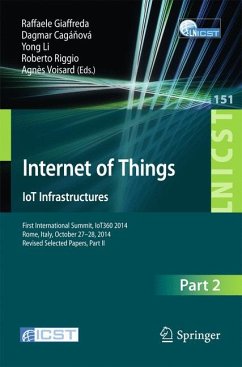
Opportunistic Networks (eBook, PDF)
Concepts and Systems
Versandkostenfrei!
Sofort per Download lieferbar
60,95 €
inkl. MwSt.
Weitere Ausgaben:

PAYBACK Punkte
30 °P sammeln!
This textbook provides an exhaustive exploration of Opportunistic Networks (OppNets). Divided into three parts, it starts with the foundational principles and metrics of OppNets, detailing their mobility and data dissemination. Significant focus is given to the security challenges faced by OppNets, including strategies to counter various attacks. The second part evaluates OppNets, introducing methods and metrics for assessment, theoretical and simulation models, and tools such as OMNeT++, The ONE and ns-3.This textbook also offers comparative analyses and discussions on benchmarking. The third...
This textbook provides an exhaustive exploration of Opportunistic Networks (OppNets). Divided into three parts, it starts with the foundational principles and metrics of OppNets, detailing their mobility and data dissemination. Significant focus is given to the security challenges faced by OppNets, including strategies to counter various attacks. The second part evaluates OppNets, introducing methods and metrics for assessment, theoretical and simulation models, and tools such as OMNeT++, The ONE and ns-3.
This textbook also offers comparative analyses and discussions on benchmarking. The third part delves into the implementation of OppNets, discussing technologies from Mobile Ad Hoc Networks to satellite communication and their integration with cellular technologies like 4G, 5G and 6G. Detailed insight into device characterization reveals the potential and limitations of devices within OppNets. Practical applications of OppNets in scenarios such as disaster management, remotecommunication, IoT challenges, smart cities and satellite networks are presented as well. Through detailed discussions and case studies, readers gain a comprehensive understanding of the structure, operation and practical implications of OppNets. It equips readers with knowledge to appreciate the vast potential of OppNets in various applications and settings.
This textbook targets advanced-level students and postdocs in computer science and electrical engineering as well as researchers, who are starting new in the area and need a comprehensive view of opportunistic networks. Practitioners who are interested in applying the concepts of opportunistic networks in their products and services, and would like to have a jump start into the development and applications of opportunistic networks will also want to purchase this book as a reference.
This textbook also offers comparative analyses and discussions on benchmarking. The third part delves into the implementation of OppNets, discussing technologies from Mobile Ad Hoc Networks to satellite communication and their integration with cellular technologies like 4G, 5G and 6G. Detailed insight into device characterization reveals the potential and limitations of devices within OppNets. Practical applications of OppNets in scenarios such as disaster management, remotecommunication, IoT challenges, smart cities and satellite networks are presented as well. Through detailed discussions and case studies, readers gain a comprehensive understanding of the structure, operation and practical implications of OppNets. It equips readers with knowledge to appreciate the vast potential of OppNets in various applications and settings.
This textbook targets advanced-level students and postdocs in computer science and electrical engineering as well as researchers, who are starting new in the area and need a comprehensive view of opportunistic networks. Practitioners who are interested in applying the concepts of opportunistic networks in their products and services, and would like to have a jump start into the development and applications of opportunistic networks will also want to purchase this book as a reference.
Dieser Download kann aus rechtlichen Gründen nur mit Rechnungsadresse in A, B, BG, CY, CZ, D, DK, EW, E, FIN, F, GR, HR, H, IRL, I, LT, L, LR, M, NL, PL, P, R, S, SLO, SK ausgeliefert werden.












